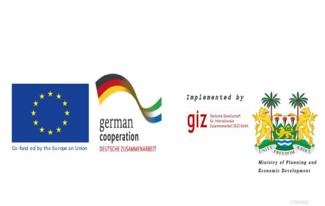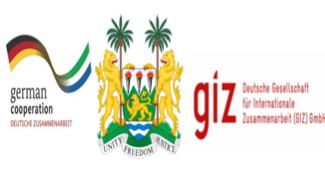
Expression of Interest (EoI)
National FBS Master Trainer: Supporting the introduction of Farmer Business School (FBS) in Sierra Leone and related capacity development activities
PN (21.2199.4-105.00)
Cosoft No 83428025
The Deutsche Gesellschaft für Internationale Zusammenarbeit (GIZ) GmbH through the Market Oriented Value Chains for Jobs and Growth in The ECOWAS Region (MOVE) project invites qualified individual consultants to express their interest for the above consultancy work.
The Market-Oriented Value Chains for Jobs and Growth in the ECOWAS Region (MOVE) project is commissioned by the Bundesministerium für wirtschaftliche Zusammenarbeit und Entwicklung (BMZ) and co-financed by the Bill and Melinda Gates Foundation (BMGF) and the European Union (EU). The project is implemented by the Deutsche Gesellschaft für Internationale Zusammenarbeit (GIZ) GmbH. The overall objective of MOVE is to build market-oriented and resilient value chains (rice and cashew) that contribute to the creation of income and employment in the ECOWAS region. Specifically, the goals of MOVE are:
MOVE is implemented in Nigeria, Ghana, Burkina Faso, Sierra Leone, Côte d’Ivoire, and Senegal, and represents the merger of two previously well-established regional projects: The Competitive Cashew Initiative (ComCashew) and the Competitive African Rice Initiative (CARI). Both respective brands CARI and ComCashew are kept under the umbrella of the MOVE project.
MOVE is implemented in Nigeria, Ghana, Burkina Faso, Sierra Leone, Côte d’Ivoire, and Senegal, and represents the merger of two previously well-established regional projects: The Competitive Cashew Initiative (ComCashew) and the Competitive African Rice Initiative (CARI). Both respective brands CARI and ComCashew are kept under the umbrella of the MOVE project.
Background on Farmer Business School (FBS)
Farmer Business School (FBS) is an approach developed in 2010 by the Sustainable Cocoa Business Project[1]“ of Deutsche Gesellschaft für Internationale Zusammenarbeit (GIZ) with support of the Bill & Melinda Gates Foundation and member companies of World Cocoa Foundation to promote entrepreneurial skills of smallholder farmers.
12 training modules comprise simple tools for better planning, economic analysis and decision-making built on technical recommendations to produce cocoa, maize and cassava. Issues related to nutrition, farm management and financial management for household and the farming business are tackled. The training curriculum has been designed and implemented for large-scale outreach. Since 2010, more than 480,000 farmers have been trained directly in Côte d’Ivoire, Ghana, Cameroon, Nigeria and Togo.
The effectiveness of the FBS training has been evaluated in 2011 and confirmed by partners target groups and external consultants. One recommendation of the evaluation process is to adapt the FBS approach for other productions systems and zones.
The core of its modules is income-oriented decision making based on cost-benefit analyses of different technologies for a lead crop and two other food crops, combined with strategy development to diversify income. Monitoring results and independent studies demonstrate the effectiveness and impact of FBS regarding these aspects, and the increasing training-demand from farmers as well as training evaluation by farmers reveal how much FBS fits to their needs. A Farmer Business School training usually comprises 25-30 farmers who are trained on five subsequent mornings with four to five hours per day. Trainings take place within the farming communities in very diverse locations, such as communal houses, churches, warehouses, schools, meeting rooms of cooperatives, houses of village chiefs, rural agricultural training centres or under a tree close to clay walls for visualising posters.
Overall goal
Successful adaptation of the standardized FBS training materials to the context of the republic of Sierra Leone is very crucial to effectively meet the farming conditions and the farmers level as well as successful organization and support the facilitation of the training of trainers. The consultant is expected to revise training materials for rice and cashew value chains. To adapt the existing standardized rice and cashew FBS training materials to the country and value chains context (incl. language adaptation) to suit the local farming context and ensure identification of the target group with the contents of the training. To support the international FBS master trainer in the review of the training materials, pilot training, ToT and follow up trainings
Tasks of Consultant
- Use existing data required for the adaptation of the training material with the additional focus on food- and nutrition security.
- Review and adapt the existing FBS manual (training notebook, trainers’ guide and posters) of the GIZ, in close cooperation with the international FBS trainer, MOVE and the FBS Advisory Facility, looking at the specific contents and modules e.g., the gross margin analysis, food availabilities and nutritional aspects, units of measurements, Module 9 and 11 on product/project specific content etc.
- Based on the FBS manual, adapt training posters and trainers file (materials for adaptation will be provided)
- Support the pilot of the training material with the MOVE team and an international FBS Master Trainer
- Support the facilitation of the ToT which is conducted by an international FBS Master Trainer
- Support the following Team Learning Trainings (TLG) and Pair Learning Trainings (PLG), supervised by an international FBS Master Trainer
- Conduct a follow up training if possible and with the support of the international FBS Master Trainer
- Education/training: University qualification in the field of agricultural science, agriculture economics or rural development.
- Language: Good business language skills in English and local languages
- General professional experience: at least 10 years’ experience in Sierra Leoneans agriculture sector. Experience in the rice and cashew value chains will be granted additional points.
- Specific professional experience: 4 years’ work experience in delivering trainings to extension staff and smallholder farmers ideally in the field of agribusiness or 4 years working in adult learning principles and facilitation of participatory learning process
- Leadership/management experience: 3 years of experience in leading and coordinating pluri-disciplinary teams.
- Development Cooperation (DC) experience: at least 5 years working for an international organisation in agriculture and with special focus on promoting agribusiness enterprise development and value links
- Other: Good report writing skills and ability to produce high quality and neat report with minimum or no support including good knowledge of office words (words, excel and power point)
Documents to be submitted
Interested individual consultants with proven experience in this area of work are kindly requested to express their interest for the above-mentioned project.
Please send the following documents:
- Official letter expressing interest
- CV clearly showing similar work done
- Detailed workplan
Eligible individual experts should submit their “Expression of Interest” ONLY via Email to SL_Quotation@giz.de not later than 31st December 2022 4:30 PM local time, clearly marked with “National FBS Master Trainer: Supporting the introduction of Farmer Business School (FBS) in Sierra Leone and related capacity development activities Cosoft No: 83428025 ”
[1] GIZ implemented the Sustainable Cocoa Business project (from 2009 to 2014) commissioned by the German Ministry of Economic Cooperation and Development (BMZ) and co-funded by the World Cocoa Foundation (WCF) as part of its on-going Cocoa Livelihoods Program (CLP). The latter was financed by the Bill & Melinda Gates Foundation (BMGF) and private partners. The program was renamed in 2014 to Sustainable Smallholder Agri-business (SSAB) and it receives funding from BMZ and European Union.



